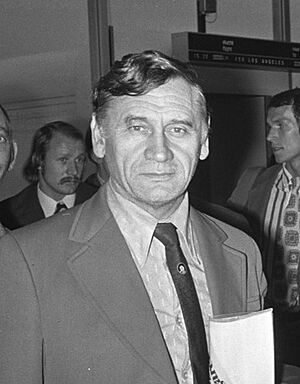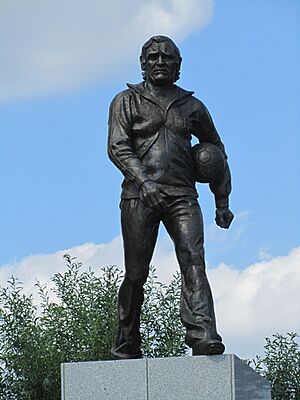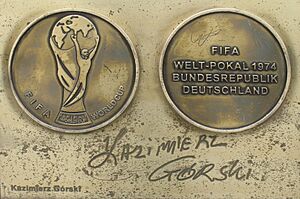Kazimierz Górski facts for kids
 |
|||
| Personal information | |||
|---|---|---|---|
| Full name | Kazimierz Klaudiusz Górski | ||
| Date of birth | 2 March 1921 | ||
| Place of birth | Lwów, Poland | ||
| Date of death | 23 May 2006 (aged 85) | ||
| Place of death | Warsaw, Poland | ||
| Position(s) | Striker | ||
| Senior career* | |||
| Years | Team | Apps | (Gls) |
| 1936–1939 | RKS Lwów | ||
| 1940–1941 | Spartak Lviv | ||
| 1944 | Dynamo Lviv | ||
| 1945–1953 | Legia Warsaw | ||
| International career | |||
| 1948 | Poland | 1 | (0) |
| Managerial career | |||
| 1959 | Legia Warsaw | ||
| 1960–1962 | Legia Warsaw | ||
| 1963–1964 | KS Lublinianka | ||
| 1964–1966 | Gwardia Warszawa | ||
| 1971–1976 | Poland | ||
| 1973 | ŁKS Łódź | ||
| 1976–1978 | Panathinaikos | ||
| 1978–1980 | Kastoria | ||
| 1980–1981 | Olympiacos | ||
| 1981–1982 | Legia Warsaw | ||
| 1983 | Olympiacos | ||
| 1983–1985 | Ethnikos Piraeus | ||
| *Club domestic league appearances and goals | |||
Kazimierz Klaudiusz Górski (born March 2, 1921 – died May 23, 2006) was a famous Polish football coach and player. He is best known for leading the Polish national football team to amazing victories in the 1970s. He helped Poland win a gold medal at the 1972 Olympic Games. His team also earned a bronze medal at the 1974 World Cup. Górski was also the honorary president of the Polish Football Association. He is remembered as one of the greatest figures in Polish sports history.
Contents
Kazimierz Górski: A Football Legend
Early Playing Days
Kazimierz Górski was born in Lwów, which is now Lviv, Ukraine. He played as a forward, trying to score goals for his team. He played for several Polish football teams. These included RKS Lwów, Spartak Lviv, FC Dynamo Lviv, and Legia Warsaw. His football nickname was "Sarenka," which means "Fawn."
His promising football career was stopped by World War II. After the war, in 1948, he played his only international match for Poland. It was a game against Denmark.
Becoming a Coach in Poland
After his playing career, Kazimierz Górski decided to become a football coach. He studied at the Higher School of Physical Education in Kraków. He also studied at the Physical Education Academy in Wrocław.
He coached several well-known Polish teams. These included Legia Warsaw (three times), Marymont Warszawa, Gwardia Warszawa, Lublinianka Lublin, and ŁKS Łódź. His first coaching job was with Marymont Warszawa in 1954.
Leading the Polish National Team
Kazimierz Górski started coaching national teams in 1956. He first coached the Polish junior team until 1966. Then, he led the Polish Under-23 national team from 1966 to 1970. Finally, in 1970, he became the coach of the main Poland national football team.
His first international match as the senior team coach was on May 5, 1971. It was in Lausanne against Switzerland. Under his leadership, the Polish team achieved incredible success.
Golden Achievements
His biggest achievements were:
- Winning the gold medal at the 1972 Olympic Games in Munich. This was a huge moment for Polish football.
- Earning the bronze medal (third place) at the 1974 World Cup in Germany. This team was often called "The Golden Eleven."
- Winning another silver medal (second place) at the 1976 Olympic Games in Montreal.
Kazimierz Górski coached the Polish national team for 73 matches. His team won 45 of those games.
Qualifying for the 1974 World Cup
One of the most famous moments was when Poland qualified for the 1974 World Cup. They defeated 1966 World Cup winners England at home. Then, they held England to a draw at Wembley. This result meant Poland went to the World Cup instead of England.
Coaching in Greece
After leaving the Polish national team, Górski moved to Greece. He had a successful coaching career there. He coached famous clubs like Panathinaikos Athens, Kastoria FC, Olympiakos Piraeus, and Ethnikos Piraeus.
Role in Polish Football Association (PZPN)

From 1976, Kazimierz Górski was an honorary member of the Polish Football Union (PZPN). This is the main organization for football in Poland.
After he stopped coaching, he became more involved with PZPN in 1986. He served as a vice-president from 1987. From 1991 to 1995, he was the president of PZPN. From 1995 until his death, he was the honorary president.
Kazimierz Górski passed away from cancer on May 23, 2006. He was 85 years old and died in Warsaw.
Awards and Recognition
Kazimierz Górski received many awards for his contributions to football.
Special Honours
- FIFA Order of Merit (2006, given after his death): This is one of the highest awards in football.
- Order of Merit in Ruby – UEFA award (2006, given after his death).
- Gold Medal of Merit – FIFA award (2001).
- He also received high honors from the Polish government, including the Grand Cross of Polonia Restituta (2006, given after his death).
- He was made an honorary citizen of several cities, including Lviv and Plock.
- He received an honorary doctorate from the Gdańsk Academy of Physical Education and Sport.
Other Ways He is Remembered
 | Jewel Prestage |
 | Ella Baker |
 | Fannie Lou Hamer |


